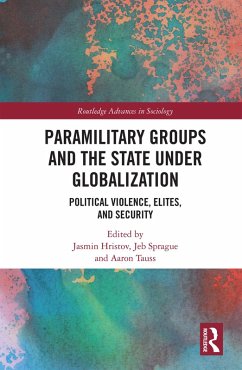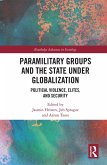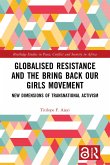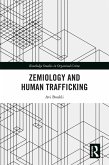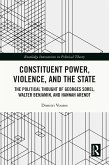Paramilitary Groups and the State under Globalization (eBook, PDF)
Political Violence, Elites, and Security
Redaktion: Hristov, Jasmin; Tauss, Aaron; Sprague, Jeb
44,95 €
44,95 €
inkl. MwSt.
Sofort per Download lieferbar

22 °P sammeln
44,95 €
Als Download kaufen

44,95 €
inkl. MwSt.
Sofort per Download lieferbar

22 °P sammeln
Jetzt verschenken
Alle Infos zum eBook verschenken
44,95 €
inkl. MwSt.
Sofort per Download lieferbar
Alle Infos zum eBook verschenken

22 °P sammeln
Paramilitary Groups and the State under Globalization (eBook, PDF)
Political Violence, Elites, and Security
Redaktion: Hristov, Jasmin; Tauss, Aaron; Sprague, Jeb
- Format: PDF
- Merkliste
- Auf die Merkliste
- Bewerten Bewerten
- Teilen
- Produkt teilen
- Produkterinnerung
- Produkterinnerung

Bitte loggen Sie sich zunächst in Ihr Kundenkonto ein oder registrieren Sie sich bei
bücher.de, um das eBook-Abo tolino select nutzen zu können.
Hier können Sie sich einloggen
Hier können Sie sich einloggen
Sie sind bereits eingeloggt. Klicken Sie auf 2. tolino select Abo, um fortzufahren.

Bitte loggen Sie sich zunächst in Ihr Kundenkonto ein oder registrieren Sie sich bei bücher.de, um das eBook-Abo tolino select nutzen zu können.
This volume examines the phenomenon of paramilitarism across Latin America and the Caribbean, Eastern Europe, Africa, and Asia, offering a nuanced perspective while identifying key patterns in the way paramilitary violence is implicated in processes of capital accumulation, state-building, and the reproduction of social power.
- Geräte: PC
- mit Kopierschutz
- eBook Hilfe
Andere Kunden interessierten sich auch für
![Paramilitary Groups and the State under Globalization (eBook, ePUB) Paramilitary Groups and the State under Globalization (eBook, ePUB)]() Paramilitary Groups and the State under Globalization (eBook, ePUB)44,95 €
Paramilitary Groups and the State under Globalization (eBook, ePUB)44,95 €![Mapping Global Justice (eBook, PDF) Mapping Global Justice (eBook, PDF)]() Arnaud KurzeMapping Global Justice (eBook, PDF)35,95 €
Arnaud KurzeMapping Global Justice (eBook, PDF)35,95 €![Globalised Resistance and the Bring Back Our Girls Movement (eBook, PDF) Globalised Resistance and the Bring Back Our Girls Movement (eBook, PDF)]() Titilope F. AjayiGlobalised Resistance and the Bring Back Our Girls Movement (eBook, PDF)42,95 €
Titilope F. AjayiGlobalised Resistance and the Bring Back Our Girls Movement (eBook, PDF)42,95 €![Global Governance Futures (eBook, PDF) Global Governance Futures (eBook, PDF)]() Global Governance Futures (eBook, PDF)34,95 €
Global Governance Futures (eBook, PDF)34,95 €![Zemiology and Human Trafficking (eBook, PDF) Zemiology and Human Trafficking (eBook, PDF)]() Avi BoukliZemiology and Human Trafficking (eBook, PDF)42,95 €
Avi BoukliZemiology and Human Trafficking (eBook, PDF)42,95 €![The Politics of Combating Human Trafficking in the United States (eBook, PDF) The Politics of Combating Human Trafficking in the United States (eBook, PDF)]() Nancy E. MarionThe Politics of Combating Human Trafficking in the United States (eBook, PDF)42,95 €
Nancy E. MarionThe Politics of Combating Human Trafficking in the United States (eBook, PDF)42,95 €![Constituent Power, Violence, and the State (eBook, PDF) Constituent Power, Violence, and the State (eBook, PDF)]() Dimitri VourosConstituent Power, Violence, and the State (eBook, PDF)44,95 €
Dimitri VourosConstituent Power, Violence, and the State (eBook, PDF)44,95 €-
-
-
This volume examines the phenomenon of paramilitarism across Latin America and the Caribbean, Eastern Europe, Africa, and Asia, offering a nuanced perspective while identifying key patterns in the way paramilitary violence is implicated in processes of capital accumulation, state-building, and the reproduction of social power.
Dieser Download kann aus rechtlichen Gründen nur mit Rechnungsadresse in A, B, BG, CY, CZ, D, DK, EW, E, FIN, F, GR, HR, H, IRL, I, LT, L, LR, M, NL, PL, P, R, S, SLO, SK ausgeliefert werden.
Produktdetails
- Produktdetails
- Verlag: Taylor & Francis eBooks
- Seitenzahl: 336
- Erscheinungstermin: 30. Dezember 2021
- Englisch
- ISBN-13: 9781000530827
- Artikelnr.: 63045578
- Verlag: Taylor & Francis eBooks
- Seitenzahl: 336
- Erscheinungstermin: 30. Dezember 2021
- Englisch
- ISBN-13: 9781000530827
- Artikelnr.: 63045578
- Herstellerkennzeichnung Die Herstellerinformationen sind derzeit nicht verfügbar.
Jasmin Hristov, PhD, is an assistant professor of sociology and development studies at the University of Guelph, Canada. Jasmin is the author of: Paramilitarism and Neoliberalism: Violent Systems of Capital Accumulation in Colombia and Beyond (2014) and Blood and Capital: the Paramilitarization of Colombia (2009). Her work includes refereed articles featured in Sociology of Development, Canadian Review of Sociology, Journal of Peasant Studies, Latin American Perspectives, Journal of Peacebuilding and Development, Labour, Capital and Society, Islamic Perspective: Journal of Islamic Studies and Humanities and Social Justice as well as chapters in Gender and Development: the Economic Basis of Women's Power (2019), Gendering Globalization, Globalizing Gender: Post-Colonial Perspectives (2020), and The Routledge Handbook of Transformative Global Studies (2020). Jasmin is also the recipient of the Early Investigator Award (2019) from the Canadian Sociological Association. Jeb Sprague, PhD, is a lecturer at the University of California Los Angeles. Sprague is the author of Paramilitarism and the Assault on Democracy in Haiti (2012) and Globalizing the Caribbean: Political Economy, Social Change, and the Transnational Capitalist Class (2019). He is also the editor of Globalization and Transnational Capitalism in Asia and Oceania (2016). His work includes refereed articles featured in Third World Quarterly, Journal of World-Systems Research, Research in Political Economy, Caribbean Studies, Monthly Review, and Current Perspectives in Social Theory. Jeb is a founding member of the Network for Critical Studies of Global Capitalism. Aaron Tauss, PhD, is an associate professor of international relations at the National University of Colombia, Medellin. Aaron is the editor of Sozial-ökologische Transformationen - Das Ende des Kapitalismus denken, VSA and a co-editor of ¿Pensar el fin del capitalismo? Escenarios y estrategias de transformación socioecológica, and Andere mögliche Welten? - Krise, Linksregierungen, populare Bewegungen: Eine lateinamerikanische-europäische Debatte. His publications are featured in Columbia Internacional, NACLA Report on the Americas, Prokla, Desafíos and Blätter für deutsche und internationale Politik.
Introduction
1. Theorizing Non-State Armed Actors in the Era of Economic Globalization:
Beyond the Criminal and the Terrorist
Part One: Paramilitaries and Capital Accumulation
2. The Pro-Business Effects of Paramilitary Terror in Colombia:
Appreciating Different Types of Political Violence and Their Economic
Impacts
3. Paramilitarism in Progress: The War against Social Movements from Below
in Honduras
4. Institutionalized Terror: Paramilitaries and the Guatemalan State
5. Enforcing Accumulation in a Geo-Strategic Region: Paramilitaries in
Oaxaca, Mexico
Part Two: The Struggle for the State: Paramilitarism as a Strategy of
Movements from Above
6. Transnational Paramilitary Connections: Right-wing Violence in Venezuela
as a Strategy to Restore Political Hegemony
7. Conquering the Local Level: Connections and Frictions Between Local
Governments and Paramilitaries in Uganda, Zimbabwe, and Colombia
8. Shifts in Coercion under Globalization: Lessons from Haiti's
Restructuring in the Global Era
9. Landowners, Politicians, and the Threat from Below: Emergence and
Evolution of Paramilitary Groups in Chiapas, Mexico
Part Three: Paramilitary Actors and State-Building
10. US Support for "Civilian Defence" Paramilitaries in Iraq and
Afghanistan
11. Non-State Armed Actors and State-building: The Symbiotic Relationship
between Paramilitary Forces and the State in Post-Soviet Georgia
(1991-2012)
12. The Violent Roots of the New Elite: Serbian Paramilitaries in the
Transition from Socialism to Capitalism
Part Four: Variations in Paramilitary Structure and Purpose
13. Disturbing the Peace: Paramilitarism across Southeast Asia
14. Paramilitary Groups and Civilian Self-Defense Force Mobilization in
Peru
15. God's Vigilantes: Islamist Paramilitarism in Modern Pakistan
Conclusion
1. Theorizing Non-State Armed Actors in the Era of Economic Globalization:
Beyond the Criminal and the Terrorist
Part One: Paramilitaries and Capital Accumulation
2. The Pro-Business Effects of Paramilitary Terror in Colombia:
Appreciating Different Types of Political Violence and Their Economic
Impacts
3. Paramilitarism in Progress: The War against Social Movements from Below
in Honduras
4. Institutionalized Terror: Paramilitaries and the Guatemalan State
5. Enforcing Accumulation in a Geo-Strategic Region: Paramilitaries in
Oaxaca, Mexico
Part Two: The Struggle for the State: Paramilitarism as a Strategy of
Movements from Above
6. Transnational Paramilitary Connections: Right-wing Violence in Venezuela
as a Strategy to Restore Political Hegemony
7. Conquering the Local Level: Connections and Frictions Between Local
Governments and Paramilitaries in Uganda, Zimbabwe, and Colombia
8. Shifts in Coercion under Globalization: Lessons from Haiti's
Restructuring in the Global Era
9. Landowners, Politicians, and the Threat from Below: Emergence and
Evolution of Paramilitary Groups in Chiapas, Mexico
Part Three: Paramilitary Actors and State-Building
10. US Support for "Civilian Defence" Paramilitaries in Iraq and
Afghanistan
11. Non-State Armed Actors and State-building: The Symbiotic Relationship
between Paramilitary Forces and the State in Post-Soviet Georgia
(1991-2012)
12. The Violent Roots of the New Elite: Serbian Paramilitaries in the
Transition from Socialism to Capitalism
Part Four: Variations in Paramilitary Structure and Purpose
13. Disturbing the Peace: Paramilitarism across Southeast Asia
14. Paramilitary Groups and Civilian Self-Defense Force Mobilization in
Peru
15. God's Vigilantes: Islamist Paramilitarism in Modern Pakistan
Conclusion
Introduction
1. Theorizing Non-State Armed Actors in the Era of Economic Globalization:
Beyond the Criminal and the Terrorist
Part One: Paramilitaries and Capital Accumulation
2. The Pro-Business Effects of Paramilitary Terror in Colombia:
Appreciating Different Types of Political Violence and Their Economic
Impacts
3. Paramilitarism in Progress: The War against Social Movements from Below
in Honduras
4. Institutionalized Terror: Paramilitaries and the Guatemalan State
5. Enforcing Accumulation in a Geo-Strategic Region: Paramilitaries in
Oaxaca, Mexico
Part Two: The Struggle for the State: Paramilitarism as a Strategy of
Movements from Above
6. Transnational Paramilitary Connections: Right-wing Violence in Venezuela
as a Strategy to Restore Political Hegemony
7. Conquering the Local Level: Connections and Frictions Between Local
Governments and Paramilitaries in Uganda, Zimbabwe, and Colombia
8. Shifts in Coercion under Globalization: Lessons from Haiti's
Restructuring in the Global Era
9. Landowners, Politicians, and the Threat from Below: Emergence and
Evolution of Paramilitary Groups in Chiapas, Mexico
Part Three: Paramilitary Actors and State-Building
10. US Support for "Civilian Defence" Paramilitaries in Iraq and
Afghanistan
11. Non-State Armed Actors and State-building: The Symbiotic Relationship
between Paramilitary Forces and the State in Post-Soviet Georgia
(1991-2012)
12. The Violent Roots of the New Elite: Serbian Paramilitaries in the
Transition from Socialism to Capitalism
Part Four: Variations in Paramilitary Structure and Purpose
13. Disturbing the Peace: Paramilitarism across Southeast Asia
14. Paramilitary Groups and Civilian Self-Defense Force Mobilization in
Peru
15. God's Vigilantes: Islamist Paramilitarism in Modern Pakistan
Conclusion
1. Theorizing Non-State Armed Actors in the Era of Economic Globalization:
Beyond the Criminal and the Terrorist
Part One: Paramilitaries and Capital Accumulation
2. The Pro-Business Effects of Paramilitary Terror in Colombia:
Appreciating Different Types of Political Violence and Their Economic
Impacts
3. Paramilitarism in Progress: The War against Social Movements from Below
in Honduras
4. Institutionalized Terror: Paramilitaries and the Guatemalan State
5. Enforcing Accumulation in a Geo-Strategic Region: Paramilitaries in
Oaxaca, Mexico
Part Two: The Struggle for the State: Paramilitarism as a Strategy of
Movements from Above
6. Transnational Paramilitary Connections: Right-wing Violence in Venezuela
as a Strategy to Restore Political Hegemony
7. Conquering the Local Level: Connections and Frictions Between Local
Governments and Paramilitaries in Uganda, Zimbabwe, and Colombia
8. Shifts in Coercion under Globalization: Lessons from Haiti's
Restructuring in the Global Era
9. Landowners, Politicians, and the Threat from Below: Emergence and
Evolution of Paramilitary Groups in Chiapas, Mexico
Part Three: Paramilitary Actors and State-Building
10. US Support for "Civilian Defence" Paramilitaries in Iraq and
Afghanistan
11. Non-State Armed Actors and State-building: The Symbiotic Relationship
between Paramilitary Forces and the State in Post-Soviet Georgia
(1991-2012)
12. The Violent Roots of the New Elite: Serbian Paramilitaries in the
Transition from Socialism to Capitalism
Part Four: Variations in Paramilitary Structure and Purpose
13. Disturbing the Peace: Paramilitarism across Southeast Asia
14. Paramilitary Groups and Civilian Self-Defense Force Mobilization in
Peru
15. God's Vigilantes: Islamist Paramilitarism in Modern Pakistan
Conclusion
